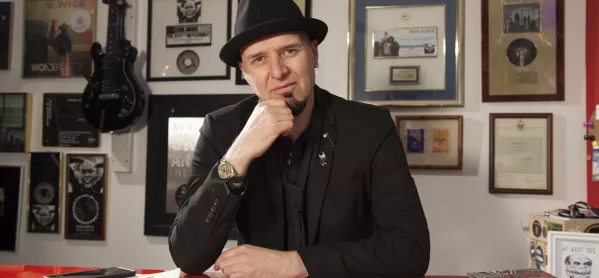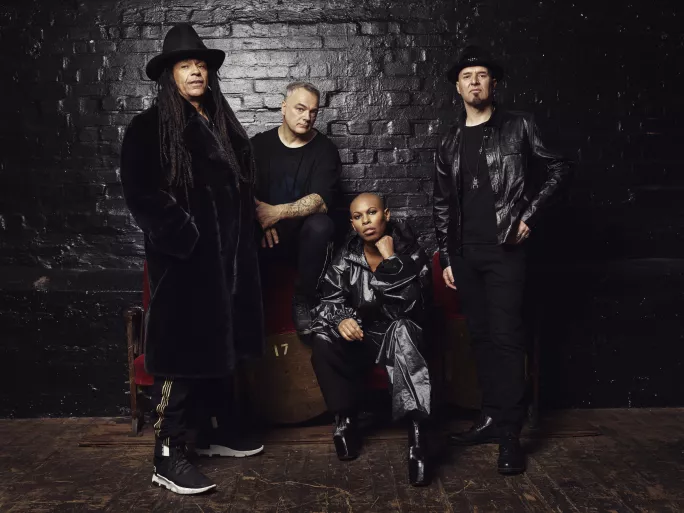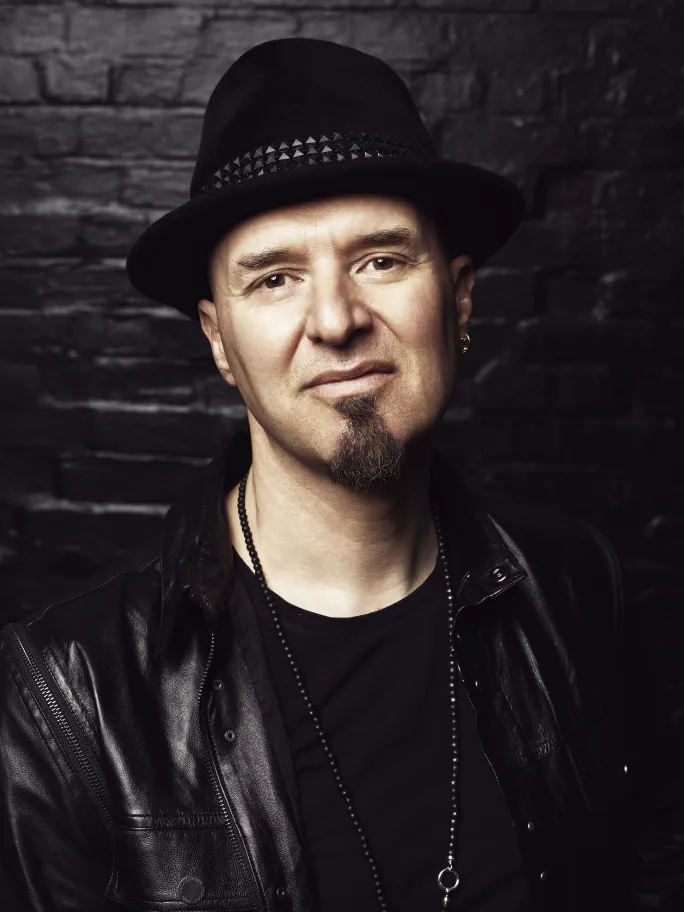- Home
- Meet Ace: the rock star transforming music education
Meet Ace: the rock star transforming music education

Mention the name Ace to thirty-something rock music fans and it’s likely they will talk about the guitarist from the rock band Skunk Anansie. What they may not know is that the same man is a senior leader at a training provider specialising in the music industry.
Ace and his bandmates released their latest album at the beginning of the year, then spent the summer playing gigs and headlining festivals in front of hundreds of thousands of people across Europe. But in his day job he is director of creative industry development at the Academy of Contemporary Music (ACM).
The provider describes itself as a specialist music college offering degrees and level 2 and 3 diplomas, operating across sites in London, Guildford and Birmingham. Its partners include Guildford College, Middlesex University and the University of Surrey. For the past five years, Ace has worked full-time at ACM, reimagining and reshaping its industry provision.
News: What the Queen’s Speech says about further education
More: Revealed: Tes’ 10 most influential people of 2019
Opinion: Why college staff deserve our thanks this Christmas
Ace’s name is an obvious talking point. It’s not one he gave himself - nor, unsurprisingly, was it the name chosen for him at birth. In the early ‘90s, he was living in London and auditioning for rock bands. When the band Big Life Casino asked him what he thought of their music during one such audition, he replied: “It’s ace!” A few days later, they rang and offered him a place in the band. In his first session, it became apparent that they’d forgotten his real name, Martin Kent.
“They’d listened to the cassette recording of my audition, and heard ‘It’s ace!’ And so they told everyone in London - and they knew everyone - that they’d got a new guitarist called ‘Ace’. Everywhere I went, it preceded me. I’d go to an event and they’d say, ‘Your name is on the door,’ and it was always down as ‘Ace’. It just stuck,” he says.

Ace grew up in Cheltenham with his parents and two brothers. His dad worked in a cereal box factory, and his mum in Kwik Save. The family didn’t have much money, he says, and the boys were all eager to work and earn as soon as they could.
By the age of 14, he was working in bars, saving his money to pay for music records, gig tickets and guitars. He’d had his first experience of rock music two years before that and had already decided what he was going to do with the rest of his life: he was going to be in a band.
“When my older brother was 16, he got into rock music and started to go to concerts,” Ace recalls. “I begged my mother to let me go with him - and when I was 12 we went see Motörhead. They were the big thing in heavy metal at that time. We walked into the Odeon in Birmingham and I was just transported. I was like, ‘Oh my God, this exists and I am going to do it.’ I was a very driven child.”
But the path to rock stardom came with many twists and turns for Ace. At 16, his father encouraged him to finish education and get a full-time job. When Martin expressed a desire to go to art school - to pursue a subject he excelled in - his dad told him that he’d be 20, have no money and no job. And so, he found himself sat in an interview for an office job in the factory his dad worked in. “I sat there, thinking, ‘Ah man, is this it? Am I going to spend my life in a factory?’”
College education
Determined to avoid office work, Ace applied for a role at a graphic design studio instead. It paid just £30 a week - and he said he would take the job, provided he could attend college at the same time. The manager agreed, and he went on to gain a diploma in graphic design from Gloucestershire College.
Ace spent a happy eight years working in the studio during the day, and making money from gigging in the evenings and on the weekends, having secured a small record deal with his then-band. And then one day, he arrived at work to be told he was being made redundant.

“My freedom had become my prison,” he says. “I had a nice job, a wicked flat in town, a sports car, a motorbike. I went to work and was in a band that was a big fish in a small pond. You think you’re free, but everything around you holds you there. You’re in a prison of your own making.
“In a way, [the redundancy] was a blessing. It was the push I needed. I thought, ‘I can do what I want now,’ and no-one can say to me, ‘You gave up your job.’”
The next week, he moved to London. A few days later, he began gigging with Big Life Casino. None of the three band members had any money - and they had to be inventive. The band opened The Splash Club, a gig venue in Kings Cross, working on the door, operating the lights and being the stage manager between them. It quickly began a place of rock ‘n’ roll legend: it’s where Oasis played their first gig, Ocean Colour Scene were signed and Paul Weller was a regular.
It’s also where Ace met Skin and Cass, who he went on to form Skunk Anansie with. The band’s rise to the top is the stuff of dreams. A year after their first gig at The Splash Club in 1994, they were named as the best new British band by rock magazine Kerrang!. The rest is history; a decade of world tours, best-selling albums and awards ceremonies followed. Highlights included a gig at Nelson Mandela’s 80th birthday party, and a performance with Pavarotti.
Ace became an expert in song-writing, performance and production - and, in whatever spare time he had, he shared his expertise with those who wished to follow in his footsteps.
Bruce Dickinson, not Iron Maiden’s lead singer but from Little Angels fame, became a close friend, setting up the ACM in 1994 . It was still based in a “tiny church hall” when Ace first began delivering masterclasses there - now it is spread across three sites. When Dickinson left to co-found the Brighton Institute of Modern Music, he took Ace with him.
He was put in charge of the live performance course, and then the gig preparation and artist and repertoire (A&R) courses. He started to bring in contacts from the rock industry to share their experience with the students - and went on to set up an award-winning college radio show.
“If you do something and you enjoy it too much you’ll win an award,” he laughs. “Bruce said to me, ‘You know what, you’re so good at this, what you should do is an MA. If you do an MA you can become a head of a MA college’. And I thought, ‘Yeah I can do that, that sounds like money.’”
Inspiring music students
Ace went on to gain an MA in media and project management from Middlesex University - and, true to his word, Dickinson offered him the opportunity to open an MA college within the Brighton Institute of Modern Music.
While Ace was mulling over the offer, he received an unexpected call from former bandmate Skin. They met up for a night out; by the morning, Skunk Anansie was back together. Within a week, they had another record deal and a new album on the way. Ace turned down Dickinson’s offer.
“When I went into Skunk I went back with huge amounts of knowledge. I came with an MA, teaching experience, understanding of the music business, record deals, lawyers contracts, production, all of these things,” he says. “In my back pocket, I thought, ‘I’ve got all these things I can do.’ In 2011, we made a new album, and we toured it and it was very successful and then Skin asked for a couple of years off. And most people would think, ‘Oh no, a couple of years off, what am I going to do?’”
Not Ace. He returned to teaching and set up his own provision: the Ace Guitar Academy, offering guitar lessons at colleges and performances spaces across the world.

Soon after, he was offered a full-time job back where it all started: ACM. Again, he was put in charge of injecting his passion, connections and knowledge into its creative industry course. These days he’s not just a course leader, but director of creative industry development - and he loves it. It keeps him busy, he says; even though the band has reformed once again, the workload is manageable.
“People always say to me, ‘How do you manage to do all of this?’ But you’ve gotta remember, when you’re a band of certain size and you’ve been going a long time, you have a lot of time on your hands. The amount of work we do in a year as a band, if you squish it all together, it’s probably about two months.
“Because I’m not a teacher, but a director across all of the colleges, I’m not based in one place. In the summer, the gigs only take about three and a half hours’ work. So I’ve got at least eight hours a day in which I can work. I sort emails, I chat to people, I can get a lot done.”
And Ace has a day job that he clearly adores: “Being surrounded by creative young people gives you energy. It’s the best job. When you get a bunch of old people, talking, talking, talking in meetings, it’s a bit, like, eurgh.
“Being surrounded by staff and tutors who are like-minded industry professionals is brilliant. You know, [once] I was in college with a sponsor and he wanted a tour. We walk down the corridor and I’m like, ‘Oh, there’s Pete Riley, he was in Republica. There’s Paul Turner, he’s from Jamiroquai, he’s the bass player. There’s Neil Murray, he was in Whitesnake and Black Sabbath. Hold on, is Brian Henry teaching keys? He’s in Soul II Soul,” Ace laughs. “It sounds like I’m making it up.” And Ace makes full use of his professional contacts: he even persuaded Queen’s Brian May to offer a scholarship.
The tutors don’t just have experience of the music business - they’re still experiencing the business for themselves.
“Every day is a new learning curve,” Ace says. “I never thought I’d end up doing this - and it’s transformed me into a different person, and if you stop listening you stop growing. And if you stop growing you stagnate. And then you’re that little old person in the street who can’t remember to cross the road. That’s never going to be me.”
Keep reading for just £1 per month
You've reached your limit of free articles this month. Subscribe for £1 per month for three months and get:
- Unlimited access to all Tes magazine content
- Exclusive subscriber-only stories
- Award-winning email newsletters



